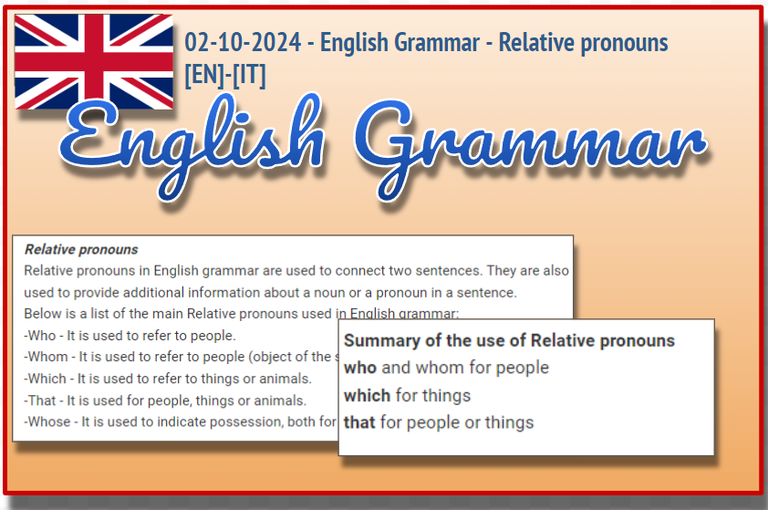
~~~ La versione in italiano inizia subito dopo la versione in inglese ~~~
ENGLISH
02-10-2024 - English Grammar - Relative pronouns [EN]-[IT]
With this post I would like to give a short instruction about the topic mentioned in the subject
(code notes: X_080)
Relative pronouns
Relative pronouns in English grammar are used to connect two sentences. They are also used to provide additional information about a noun or a pronoun in a sentence.
Below is a list of the main Relative pronouns used in English grammar:
-Who - It is used to refer to people.
-Whom - It is used to refer to people (object of the sentence).
-Which - It is used to refer to things or animals.
-That - It is used for people, things or animals.
-Whose - It is used to indicate possession, both for people and things.
Here is a sort of scheme:
SUBJECT - OBJECT - POSSESSIVE
who - who/whom - whose
which - which - whose
that - that - ___
Summary of the use of Relative pronouns
who and whom for people
which for things
that for people or things
Examples
If we want to let someone know that we would like to return a dress because we don't like it, we can use the following sentence (the Relative pronouns are in bold)
This is the dress which I would like to return.
Another example could be to inform that the doctor who examined our mother is a friend of ours.
The sentence could be the following (the Relative pronouns are in bold)
My friend, who is a doctor, examined my mother.
Whose
Whose is used as a possessive form of who.
Here is an example where we introduce our friend Lucia, adding the information that Lucia's mother was our maths teacher.
This is Lucia, whose mother was my Maths teacher.
Conclusions
The most well-known Relative pronouns in English grammar are: who, which, that, whose, whom.
Question
When you speak to someone in English, do you often use Relative pronouns or do you try to break sentences in two so as not to use them?

[ITALIAN]
02-10-2024 - Grammatica inglese - Relative pronouns [EN]-[IT]
Con questo post vorrei dare una breve istruzione a riguardo dell’argomento citato in oggetto
(code notes: X_080)
Relative pronouns
I pronomi relativi nella grammatica inglese vengono usati per collegare due frasi. Questi vengono usati anche per fornire informazioni aggiuntive su un nome o un pronome in una frase.
Qui di seguito una lista dei principali Relative pronouns che si usano nella grammatica inglese:
-Who - Viene usato per riferirsi a persone.
-Whom - Viene usato per riferirsi a persone (oggetto della frase).
-Which - Viene usato per riferirsi a cose o animali.
-That - Viene usato per persone, cose o animali.
-Whose - Viene usato per indicare possesso, sia per persone che per cose.
Qui di seguito una sorta di schema:
SUBJECT - OBJECT - POSSESSIVE
who - who/whom - whose
which - which - whose
that - that - ___
Sintesi dell'uso dei Relative pronouns
who e whom per le persone
which per le cose
that per le persone o le cose
Esempi
Se vogliamo far presente a qualcuno che vorremo restituire un vestito perchè non ci piace, possiamo usare la seguente frase (il Relative pronouns è riportato in grassetto)
This is the dress which I would like to return.
Un altro esempio può essere quello di informare che il dottore che esaminò nostra madre è un nostro amico.
La frase può essere la seguente (il Relative pronouns è riportato in grassetto)
My friend, who is a doctor, examined my mother.
Whose
Whose viene usato come forma possessiva di who.
Qui di seguito un esempio dove presentiamo la nostra amica Lucia, aggiungendo l'informazione che la mamma di Lucia era la nostra insegnante di matematica.
This is Lucia, whose mother was my Maths teacher.
Conclusioni
I Relative pronouns più conosciuti della grammatica inglese sono: who, which, that, whose, whom.
Domanda
Quanto parlate con qualcuno in inglese usate spesso i Relative pronouns oppure cercate di spezzare le frasi in due in modo da non usarli?
THE END




